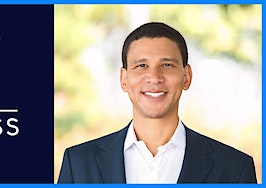Inman Connect is LIVE Aug. 8-10! Join us for impactful interviews, cutting-edge conversations and networking with thousands of real estate pros. Get valuable takeaways to thrive in a rapidly shifting market. Can’t come to Vegas? Register now for a virtual ticket.
Real estate crowdfunding has quickly gone from an unproven novelty to a tried-and-true method of raising funds for conventional and unconventional real estate projects alike.
Inspired by the early 2000s rise in political grassroots digital fundraising, real estate investors — especially those with marketing chops — quickly realized they could use crowdfunding to raise cash for their projects without going through a bank or putting their credit score at risk.
On the investor side, the advantages are equally clear. In an era when the skyrocketing cost of homeownership has left nearly three-quarters of homeowners with regrets about their home purchase, crowdfunding is an opportunity to put some money in a booming market without making a huge commitment.
And on top of the very low price of admission, crowdfunding disperses risk among a huge pool of investors, and offers the possibility of unusually high returns.
But crowdfunding your real estate projects isn’t necessarily easy. Successful crowdfunding takes industry know-how, marketing savvy and flexibility. Here are six helpful tips on utilizing real estate crowdfunding platforms.
1. Pick the right fundraising platform
There are a number of popular real estate crowdfunding platforms, including RealtyMogul, Fundrise, Yieldstreet, and others.
Each platform offers unique benefits and imposes different requirements on investors. Service fees range from 0 percent up to 2.5 percent, annual returns range from 2 percent up to an impressive 20 percent, and account minimums range from $10 all the way up to $10,000.
Some platforms cater to accredited investors, while others lean toward the unaccredited — and depending on when you launch your project, some platforms may be offering valuable promotional discounts.
Carefully study the pros and cons of each platform, and pick the one that’s most likely to lead to the success of your project. And before you make a final decision, make sure you perform some basic due diligence to make sure your choice has good reviews and a solid track record.
2. Keep in mind the caps on crowdfunding investments
To protect investors from the risks associated with crowdfunding, the U.S. Securities and Exchange Commission (SEC) limits the amount of money that non-accredited lenders can put into a crowdfunded project.
Keep this in mind when you’re putting together funding projections, since non-accredited investors can only contribute so much to your project, no matter how deep their pockets are.
At present, the limits are based on the number $124,000. If either a non-accredited investor’s net worth or annual income is less than $124,000, then during any 12-month period, your crowdfunding investment is limited to the greater of either $2,500 or 5 percent of the greater of your net worth or annual income.
On the other hand, if you have an annual income and a net worth that are both equal to or greater than $124,000, then during a 12-month period, you’re allowed to invest up to 10 percent of your annual income or net worth, whichever is greater. However, the investment cannot exceed $124,000.
However, there are no investment limits for accredited investors.
3. Give prospective investors a lot of information
Real estate development, like any other field, typically runs on relationships. Conventional investors place their money with people they know and trust, whose track records they’re familiar with, and who they’ve likely met face to face.
With a crowdfunded project, your investors don’t know you. That lack of familiarity translates to higher risk, so you’ll need to work hard to sell yourself and your project. Along with compiling plenty of info about the project, put together materials about your past projects and returns, industry experience, credentials, and anything else that will establish your credibility.
Consider using every tool at your disposal to build trust and rapport with your audience, including video presentations, social media, and frequent updates through the crowdfunding platform. You’re not just selling investors on your project — you’re also selling them on yourself.
4. Manage investor expectations
Two major ways that crowdfunded real estate investments differ from conventional investments are the investment period and the degree of investor control.
Crowdfunded real estate investments often have unique liquidity profiles and can take longer to bear fruit than conventional investments. Holding periods of up to seven to 10 years aren’t unusual in crowdfunded projects. In contrast, some investors will sell a conventional buy-and-hold rental investment after only three to five years.
Combine that with the second difference — a lack of investor input in decision-making — and your investors will have to bring quite a bit of patience and trust to your project. Unlike most conventional investments, where their money gets them a seat at the decision-making table, investors who put money in a crowdfunded project will have zero input on how the investment is managed.
It’s vital that your investors understand this going in to avoid serious frustration down the line.
5. Take care of your investors — and keep in touch
One of the most interesting things about crowdfunding is that projects often attract novice investors who may only put in a small amount of money, but invest a huge amount of hope and emotion. As home prices continue to rise — they’ve far outpaced inflation since 2020 — it’s reasonable to expect that a lot of priced-out, would-be home buyers will invest in real estate through unconventional means like crowdfunding instead of buying a house.
Give these investors the engagement (and returns) they crave, and they’ll be loyal to your brand forever. Make sure you post regular updates on your project page, so your investors can follow the project’s progress. Remember, today’s happy small investor could be tomorrow’s whale.
Luke Babich is the CSO of Clever Real Estate in St. Louis. Connect with him on Facebook or Twitter.
Get Inman’s Property Portfolio Newsletter delivered right to your inbox. A weekly roundup of news that real estate investors need to stay on top, delivered every Tuesday. Click here to subscribe.













